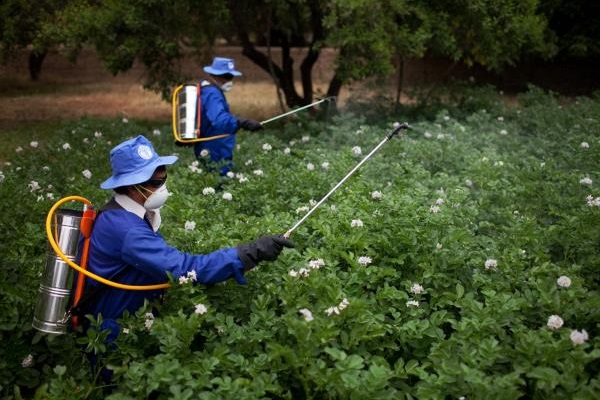Growing need to revamp national laws governing pesticides
25 November 2015, Rome - Some thirty years to the day after FAO first launched its International Code of Conduct on the Distribution and Use of Pesticides, the UN food agency is calling on countries to make sure that national regulatory frameworks governing the management of pesticides are kept up to date.
"Despite the very significant progress achieved since the original promulgation of the Code, many national frameworks for managing pesticides are in need of upgrades to face today's challenges," said Ren Wang, FAO Assistant Director-General for Agriculture and Consumer Safety.
Much more is now known about the long-term health and environmental effects of pesticides, new international agreements have been put in place and it is broadly recognised that poor pesticide management can have negative effects on trade in agricultural produce. Pesticide legislation formulated in the 80s and 90s needs a health check-up to ensure that countries are effectively protecting people and the environment, Wang warned.
Globally, the use of pesticides has continued to grow over the past three decades, he noted. Industry data suggest that the size of the global pesticide market has doubled over the past 15 years and currently exceeds $50 billion in annual sales.
New guidelines on legislation and labelling
To help address these challenges, FAO and the World Health Organization (WHO) have now released a pair of updated guidelines on pesticide legislation and labelling that take into account new developments and concerns.
The revised guidelines explain in detail the elements of a sound national pesticide legal framework, serving as a reference point for governments who are reviewing or updating existing pesticide legislation or drafting it from scratch.
And an overhauled set of Guidelines is targeted to pesticide regulatory authorities — primarily in developing countries and countries with economies in transition — who are creating or revising national pesticide labelling requirements. A critical element in protecting human health and avoiding negative environmental impacts, pesticide labels explain how to use products correctly and legally, describe potential hazards and precautionary measures, and give instructions on responding to poisonings or spills.
"FAO encourages all countries to take these guidelines into consideration when reviewing their current pesticide legislation and labelling regimes, with an aim to better protect human health and the environment and to make agriculture more sustainable," said Wang.
A code that brought order to "the Wild West"
"The 1985 International Code of Conduct on the Distribution and Use of Pesticides helped bring much needed order to a 'Wild West situation,' in which many countries did not yet have legislation for the control of pesticides, and health- and environmental problems stemming from their misuse were rampant," noted Wang. "Those who paid the steepest price were millions of poor farmers lacking access to information, training, and proper means of protection."
The Code — renamed the Code of Conduct on Pesticide Management and updated several times, most recently in 2013 — along with a series of supporting FAO guidelines, policy work, and field programs has provided an international reference framework on the control of pesticides for governments and the private sector alike.
Today, nearly all countries have pesticide legislation in place and products generally are better labelled. The most acutely toxic pesticides have been removed from the market in many countries, and alternative approaches to the use of chemicals in agriculture — such as Integrated Pest Management, which emphasizes natural methods to control and prevent pests and diseases — are increasingly becoming mainstream.
Yet despite this important progress, much remains to be done. FAO will be prioritizing support to countries to strengthen their capacity to enforce pesticide legislation and promote integrated pest management to reduce reliance on pesticides.
The agency will also provide guidance to governments to help them review their national list of authorized pesticides in order to identify highly hazardous pesticides that require special attention, for instance because the manner in which they are commonly used in the country may pose elevated risks to health or the environment.
